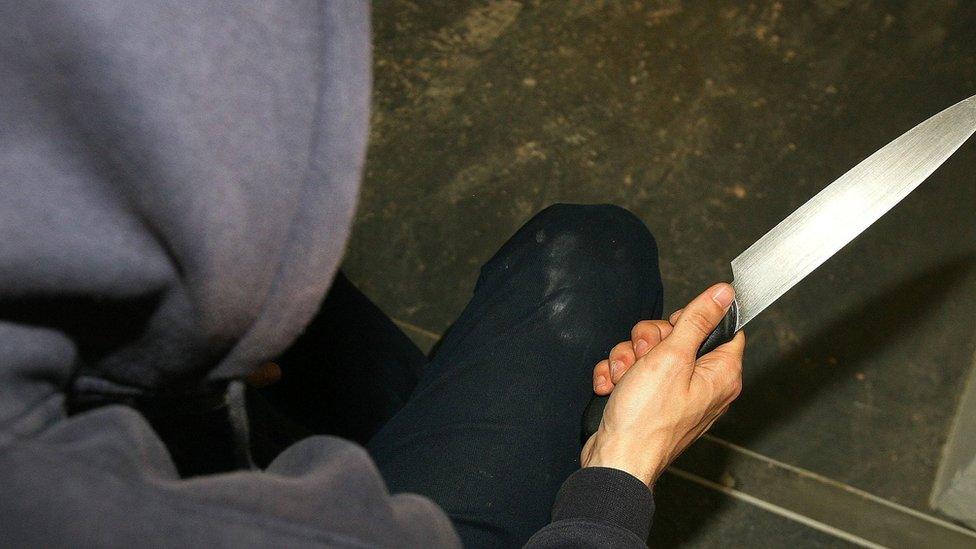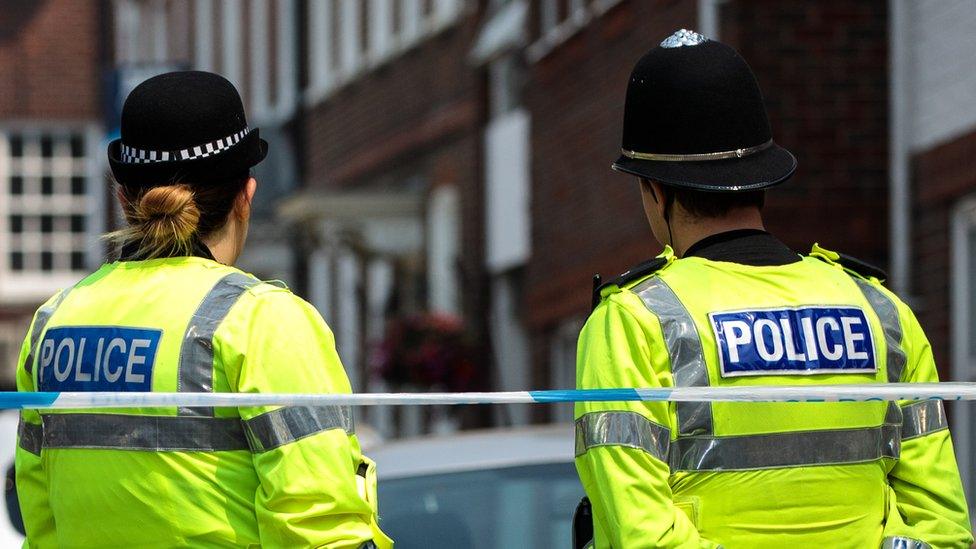Knife crime strategy too focused on gangs, says ex-police chief
- Published

England's knife crime strategy focuses too much on punishing the perpetrators and blaming gangs, a former top police officer has said.
Former Met Police superintendent Leroy Logan suggested the Home Office strategy was not fit for purpose.
It failed to take account of the fear and hopelessness some young people felt, with some not expecting to live past the age of 20, he said.
He told the Youth Select Committee only half of knife crime is linked to gangs.
The former superintendent of Hackney, east London, told the committee, made up of members of the Youth Parliament, he wanted to be "real" based on his 30 years of experience.
'Not about gangs'
"There's a correlation between violence and drug dealing, there always has been.
"But if you look at the data around knife crime you see that less than half of that crime is due to gangs or gang-related violence.
"So you have to say is the strategy being used by the Home Office and regional governments, like the Mayor of London's Office, and even local governments, is it fit for purpose?
"My real issue, out of all this, is the narrative, the narrative that's used on a regular basis, that there's a war on knives and there is a war on drugs, which is true - there is, and we need to be tough on crime and tough on the causes of crime.
"But there's an overemphasis on the punitive measures.
"I don't think they recognise that... the young people actually say they are already scared in certain areas.
"There are those who don't care if they live or die, or if anyone else lives or dies, because they don't believe their shelf life goes beyond 20.
"If you've got that mindset you've got a real toxic mixture of urban deprivation and social exclusion. So you need to understand how that has moved on."
He argued that young people needed to feel safe, and that any strategy to tackle this issue had to have young people at the heart of it, because they have the answers.
Mr Logan also blamed austerity, saying early interventions and preventions are no longer happening.
Young people are only receiving safeguarding interventions when they are quite high risk, he said.
Neighbourhood policing and school safety officers have been cut, he said, which reduced the perception of safety among young people.
John Poyton, of charity Redthread, which works with victims of knife crime, agreed knife crime was not all about drugs and gangs and said young people were feeding back this fear of not feeling safe on the streets.
He quoted young people saying "the knife gives you confidence" and "you've got to stick up for yourself, because they come more than one, they come in groups".
"When we focus on gangs and knives and when we encourage the press to lead with stories about youth violence, and show big pictures of knives, there can be a really negative knock-on effect in communities .... and that creates fear."
He added: "The perception of safety is often, I think, that more young people are picking up knives and carrying them because of this sense of fear. When they should be able to feel safe on their streets, they don't.
"We have to therefore tackle the narrative to try to ensure our communities feel safer so that young people don't feel they have to carry a knife."
'Patching up'
The youth committee is holding its first hearing of its new inquiry into the scourge of knife crime in the UK.
Its hearing comes after the Association of Directors of Children's Services published a new discussion paper on serious youth violence and knife crime.
Its president Rachel Dickinson said: "It's not enough to deal with the symptoms of this senseless violence by patching young people up and sending them home without dealing with the underlying, and often interrelated, causes that lead to it in the first place.
"Moreover, stricter laws, longer sentences and the expansion of police powers alone will do nothing to address the underlying social issues which lead to some children and communities being more vulnerable to risk or harm in the first place."
A Home Office spokesperson said early intervention is a key part of its serious violence strategy.
"We are supporting the longer term preventative public health approach including investing more than £220m in projects to turn young people away from a life of crime and have allocated £35m to invest in Violence Reduction Units aimed at tackling the causes of violence.
"Our nationwide #knifefree campaign aims to target young people and uses real stories to provide advice, support and highlights activities to empower young people to change their behaviour."
- Published5 July 2019

- Published18 July 2019